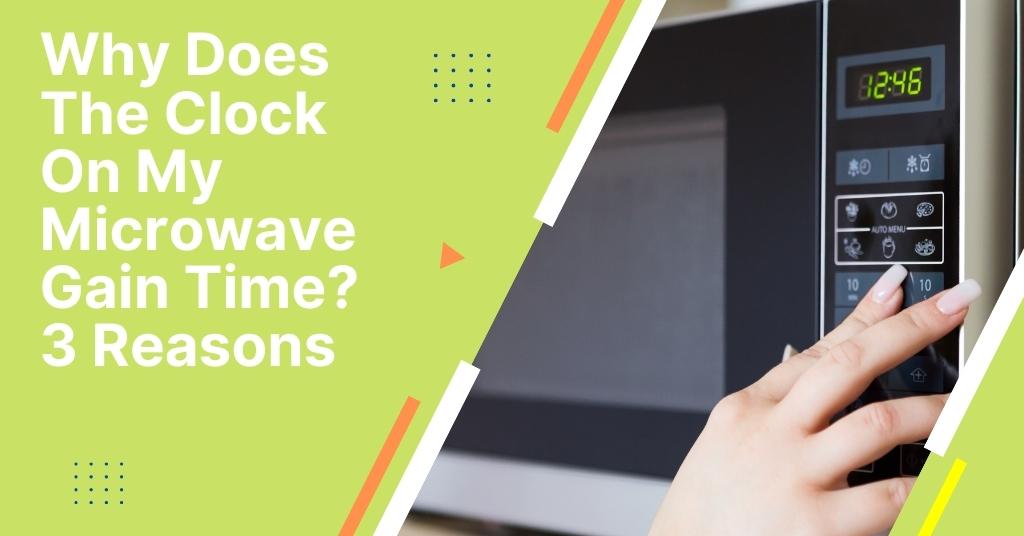I am a well-rounded expert with proficiency in several fields. My experience spans from being a dedicated chef and homemaker. As a passionate homesteader, I’ve honed my skills in sustainable living and animal care, ensuring a holistic approach to everything I undertake. Email me or Txt: (# removed due to spam, please email)
You may have noticed your microwave clock lose time, or even gain it. You may also notice the cooking time seems faster than it should be, especially if you sit there and compare it with a stopwatch.
There are several factors that can cause these time discrepancies, and some of them are actually pretty common. Here are three reasons why your microwave clock may not be accurate.

1. The first reason is power surges and outages
Unlike a laptop, phone, or desktop computer, Microwaves don’t have an internal battery solely for the purpose of powering the clock and keeping the correct time during a power outage.
When there is a power outage, the microwave clock will reset to 0:00 or 12:00 (depending on the model) and will start counting up from there once the power comes back on. So if there was a two-hour power outage, your microwave clock would be two hours behind when the power came back on.
Power surges can also affect the accuracy of the clock, although to a lesser extent than an actual power outage. If there is a power surge while the microwave is plugged in, it could cause the clock to reset or malfunction.
For these reasons, The clock will usually be reset, but the cooking times shouldn’t be affected outside of a catastrophic board failure. So what can cause cooking times in a microwave to be off? The internal resonator is often the main culprit.

2. Internal resonator oscillator is off
There are 2 methods microwaves use to keep time, an internal resonator oscillator, and the frequency of the power grid itself.
No matter which type of microwave you happen to have, They both have a chance of inconsistencies and failures of the oscillator unit when certain conditions are met.
For crystal (quartz) based resonance, the heat of the microwave itself can change the frequency in which the crystal oscillates (usually faster). Since the internal timing is based on those predictable oscillations, if they’re off even a little, the whole system is thrown off.
For power grid frequency, if the grid’s frequency changes even a little, it can cause big discrepancies in the time because the microwave is synced to that. These changes can build up over time to be massive, up to 5-10 minutes in difference.
In France, The power grid is reset once a month to avoid this problem. Just a few years ago Europe also did a reset in order to fix the same issue. (You can read more about that fascinating fact here).
With that said, if your local power grid is going through a lot of frequency changes or you live in an area with a lot of power outages, your microwave clock is going to be less accurate. Using an external power source can fix this, Although it’s almost never going to be worth doing.

3. Electromagnetic interference
Have you ever had an older microwave that absolutely destroyed your wifi every time you turned it on? If so then you’ve seen firsthand the effects of EMF, or electromagnetic fields.
In general, any kind of electronic device can be affected by EMF. This includes your microwave, which means that the clock could be reset or stopped by strong EMF interference.
EMF is created by things like power lines, electrical wiring, and even some appliances. In most cases, the EMF interference is going to be pretty minor and won’t have a noticeable effect on your microwave clock.
However, if you live near a power plant or have a lot of unshielded electrical wiring in your home, the EMF interference could be strong enough to cause problems with your clock. Moving the microwave to a different location in your home may help to reduce interference.

Final Thoughts
While power outages, surges, and EMF interference are all common causes of an inaccurate microwave clock, there are other less common reasons as well. These include a failing capacitor, loose wiring, or a faulty control board.
At the end of the day, Microwaves are easier and cheaper to replace than to repair unless they are under warranty. If your microwave is still covered, you may be able to get it repaired for free or a reduced cost.
If your microwave is no longer under warranty, the best course of action is usually just to buy a new one. In most cases, it’s going to be cheaper than paying for repairs unless you are using a high-end model.



